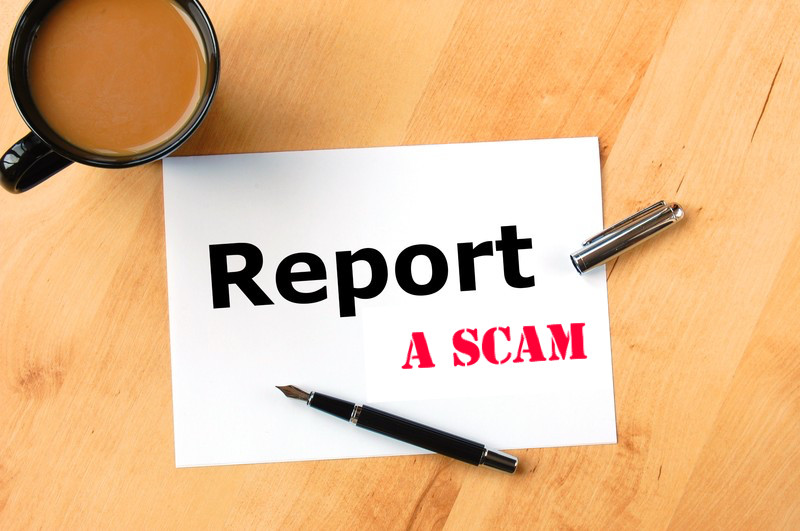What Precisely Is A Scam?
A scam is an unscrupulous strategy that uses numerous immoral methods to steal other people’s hard-earned money. Technology is improving with each passing year, and with improved technology come new scams from con artists. One would counter that when industrialization and technology occur, why do individuals still feel the need to defraud others?
How To Report A Scam Business?
Fraudsters typically con others because they are ungrateful for money. Scammers have been referred to as “the lowest of the low” for years.
Scammers are unjust individuals who have little regard for the cash or respect someone has earned through their labor of love.
Additionally, con artists lack any kind of talent, including those related to technology, content creation, education, and other fields. They are thus left with no choice but to defraud others in order to get quick money.
How to report a scam business?
Now with the way the world is heading right now, money is a need; money determines whether you live with happiness or joy, or will sadness and a sense of failure that keeps gnawing at you until your last breath.
With this desperate requirement for money to stay alive in the modern world, scammers very often tend to find their victims.
Here are some ways you can avoid scammers and their lowest tactics:
-
Bank Scams:
The main method con artists and fraudsters use to commit banking fraud are to obtain your bank account number. All of your money is stolen from you as soon as they have access to your bank account. Therefore, never disclose your bank account’s pin code to anyone, regardless of the circumstance.
-
Governmental Scams:
Government grant scammers seek to exploit you by promising to pay for your education or home upkeep with a subsidy.
They want access to your bank account information. The funds will either be “transferred into your account,” or a “one-time processing charge” will be added to it, according to their guarantee.
In actuality, the government hardly ever gives individuals freebies. They frequently go to universities, regional and national administrations, and other places.
The money is granted to support projects and research that will benefit the public.
-
‘Righteous’ or ‘Charity’ Scams:
Some con artists set up bogus businesses to take advantage of people’s generosity. They especially benefit from tragedies and disasters.
These con artists really are the lowest and most despicable types of con artists since they profit off the misfortunes that other people have to endure.
-
Lottery Scams:
Prize scammers try to steal your hard-earned money or personal information by using fake lotteries, sweepstakes, and other activities.
Many claims that you must pay a fee to collect your reward. Others seek your personal information so they may enter you in a “contest.”
These phishing emails, texts, phone calls, robocalls, postal letters, or emails might be sent to you. To avoid this, make sure you do not open links or accept calls and messages from unknown numbers or usernames without identifying who they are from either your contacts or the connections from your family and friends.
-
‘Investment’ Scams:
Scams involving investments are easily identifiable by their names. Scammers who pose as well-known businesspeople or prominent celebrities frequently carry out these schemes. These con artists will then request investment from you and provide you with a bank account to “present” your money.
Once you’ve invested, these con artists disappear and erase any communications with their victims so that you become unable to report them.
-
Covid-19 Scams:
During the COVID-19 outbreak, you may become the subject of fraud. They could contact you through social media, text, phone, email, or the post office.
Protect your finances and identity. Don’t provide personal data like your birth date, Social Security number, or bank account number. Recognize the many coronavirus scams and learn how to detect and report them.
-
Telephone Scams:
When they contact you, scammers try to take your funds or private information. Robocalls, real-person phone calls, and SMS messaging may all be used to spread scams.
Callers typically make false promises, including opportunities to invest your money, make purchases, or receive free product trials.
They might also give you money through lottery winnings and unlimited handouts. Some scam artists may call and scare you with jail time or legal action if you don’t pay them.
However, you needn’t worry because these calls are fake to scare you into listening to the lies being spewed by the con artist.
-
Ponzi Scams:
A Ponzi scheme is one type of investment fraud. Use this information to spot, report, and protect against this sort of fraud. As trivial as this may seem because of the prior mention of investment scams, these scams are also enticing because of their involvement in money.
Do not invest in any business without a contract and without viewing their site and confirming that the person contacting you is truly affiliated with the business (You can ask them private questions about the business.)
-
Pyramid Schemes:
Pyramid schemes are scams that need a constant influx of new participants to be operational. They are marketed as reputable businesses or multi-level marketing programs.
They use the “investments” of new recruits to give “profits” to participants who remain around longer.
A pyramid scheme collapses when it cannot attract sufficient prospective buyers to repay payments to prior investors. These plans will never work, and this is a mathematical fact.
-
Ticket Scams:
A ticket-selling scam is when a con artist uses tickets as an enticement to swindle you out of your money. Usually, the scam artist sells fake tickets, or you pay for a ticket but never receive it. Major performances, musicals, and sporting events frequently have sold-out audiences.
Understanding the selfish motivations of con artists may help you avoid being a victim now that you are aware of the many forms of scams.
Information:
If one day you receive a phone call, email, or text message from an unknown number or username, do not ever provide private information blindly.
Let’s assume, though, that you were regrettably duped. Now, what do you do?
The police are your first port of call, but given how overworked they are already, they might not give your fraud report any attention.
What you can do right now is to report the scammer online.
But how to report a scammer online?
Generally, if you go on Facebook or quora and such websites to present your mishaps, people call you a ‘troll’ and a ‘joke.’ They make fun of you, quoting your own painful stories back at you, so what can you indeed do to find those judgmental people?
Suggested Websites Where You Can Report A Scammer Online
Here are a few websites we recommend you visit in order to report a scammer online:
- Cyberscamreview.com
- Reportyourscam.com
We advise you to enlist the help of these companies to find your fraudster and recover any stolen property.
Given the number of hackers and fraudsters that have taken over the internet in current times, it is impossible to trust it.
So please spare yourself the headache of being yet another victim to these con artists who are looking for some cheap money at the expense of the hard work every private individual undertakes by using the websites we have advised and keeping an eye out for the sorts of scams we have highlighted.
Fraudster’s Service:
After getting conned, be sure to write down your fraudster’s service number since these websites utilize the service number to find the scammer.
If you put forth your story of being scammed by a good-for-nothing scammer, you can not only find solutions and become able to recover your lost items or money, but you can also enlighten people as to how you got scammed. This will help others avoid the one sole mistake that you made that made you lose your belongings.









